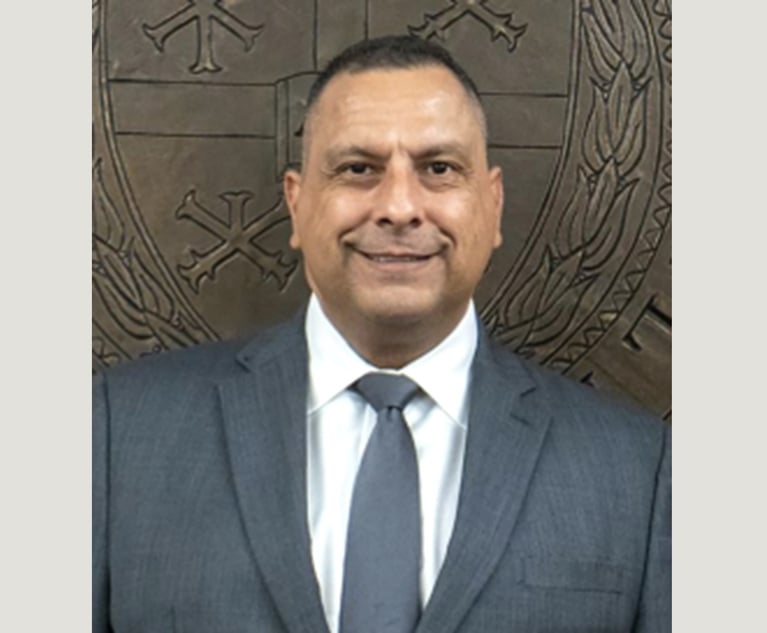Proposed Policy Change Stirs Up Debate at State Bar Executive Committee Meeting
Under a proposed policy change approved Jan. 11 by the State Bar of Texas Executive Committee, the bar's board would decide whether to uphold executive director decisions to withhold bar records requested by officers or directors of the organization.
January 16, 2018 at 06:44 PM
4 minute read

Under a proposed policy change approved Jan. 11 by the State Bar of Texas Executive Committee, the bar's board would decide whether to uphold executive director decisions to withhold bar records requested by officers or directors of the organization.
The proposal, which still must be approved by the bar board later this month, would apply to bar records not covered by the Texas Public Information Act.
“It's a policy where we don't have a policy now,” John Sirman, the bar's legal counsel, told the committee members.
But Austin solo Joe Longley, the bar's president-elect, objected to the proposed policy.
“It creates a gatekeeper for every member of the board and every officer” to keep them from seeing documents they are authorized to see, Longley said.
The policy was proposed after Longley made a request as an officer for emails sent on the bar's server to or from Tom Hunter, the spouse of Michelle Hunter, the bar's former executive director. Longley had been allowed to see about 25 emails on the computer while in the company of Don Jones, an in-house attorney at the bar. When he asked to see certain emails a second time and then asked for date-stamped copies marked confidential, the requests were not granted, Longley said.
Trey Apffel, the bar's executive director, said the emails were made available to Longley for review on a computer. But Apffel said the emails did not constitute state bar business and that he decided to take the matter to the board when Longley requested copies of them.
State bar president Tom Vick, an attorney with Vick Carney in Weatherford, said he has been told that the emails in question were incidental and have nothing to do with bar business.
Referring to the proposed policy, Vick said, “It really just formalizes what we're doing anyway.”
However, Longley said, “I think this attempt to put this proposal in effect is nothing short of a war on transparency within the state bar.”
He added, “The issue is transparency for the elected members of the bar, or nontransparency.”
Longley said state bar employees have no expectation of privacy when their emails are on the bar's email server. According to a bar policy, communications sent to or from a state bar employee using bar technology, or any other method, are public information and subject to disclosure under the Open Records/Public Information Act.
Lowell Brown, the state bar's communications director, said there would be exceptions to the disclosure requirement. Brown said employees' private communications still would be subject to any other provision under the law that would exempt them from disclosure.
“We want to do everything we can to see that officers and directors have the information to fulfill their fiduciary obligation,” Brown said.
Brown said that currently if the executive director denies a request by an officer or director for bar records, the requestor's only recourse is to take the matter to court. Under the proposal, the bar board could decide not to accept the executive director's decision and vote to release the information.
Longley cast the only vote against proposed amendments to bar policy, including the proposal to let the board decide on records requests denied by the executive director. The board will consider the proposals at its Jan. 26 meeting in San Antonio.
Also on Jan. 11, the executive committee approved the bar's nominations and elections subcommittee's recommendation to nominate Dallas attorney Lisa Blue and Houston attorney Randy Sorrels as the president-elect candidates for this year's election. Both Blue, a partner in Lisa and Baron, and Sorrels, a partner in Abraham, Watkins, Nichols, Sorrels, Agosto & Aziz, have been circulating petitions to get on the ballot.
But the committee approved a proposal that would place a new limit on petition candidates. Under that proposal, a petition signature would be considered invalid if the petition was signed earlier than 180 days before the March deadline for filing it with the executive director.
Frank Stevenson, the bar's past president and co-chairman of the nominations and elections committee, said the proposed change would “level the playing field” for candidates.
“One of the advantages of this, it basically prevents someone from collecting signatures all year round,” said Stevenson, a Dallas partner in Locke Lord.
The bar board will consider the restriction on the collection of signatures and other proposed changes in policies on elections at its Jan. 26 meeting.
This content has been archived. It is available through our partners, LexisNexis® and Bloomberg Law.
To view this content, please continue to their sites.
Not a Lexis Subscriber?
Subscribe Now
Not a Bloomberg Law Subscriber?
Subscribe Now
NOT FOR REPRINT
© 2025 ALM Global, LLC, All Rights Reserved. Request academic re-use from www.copyright.com. All other uses, submit a request to [email protected]. For more information visit Asset & Logo Licensing.
You Might Like
View All
Bracewell Adds Former Pioneer Natural Resources Lawyer to O&G, Energy Transition Practices
2 minute read

Special Counsel Jack Smith Prepares Final Report as Trump Opposes Its Release
4 minute readTrending Stories
- 1'Self-Diagnosed Nickel Allergy' Fails to Find Success in Med-Mal Suit, 8th Circuit Rules
- 2Eversheds Sutherland Adds Hunton Andrews Energy Lawyer With Cross-Border Experience
- 3Balancing Judicial Authority: Understanding Sanctions, Severance, and Interferences
- 4Up in the Air: Boeing’s Deferred Prosecution Saga Continues
- 5Legal Tech's Predictions for Knowledge Management in 2025
Who Got The Work
Michael G. Bongiorno, Andrew Scott Dulberg and Elizabeth E. Driscoll from Wilmer Cutler Pickering Hale and Dorr have stepped in to represent Symbotic Inc., an A.I.-enabled technology platform that focuses on increasing supply chain efficiency, and other defendants in a pending shareholder derivative lawsuit. The case, filed Oct. 2 in Massachusetts District Court by the Brown Law Firm on behalf of Stephen Austen, accuses certain officers and directors of misleading investors in regard to Symbotic's potential for margin growth by failing to disclose that the company was not equipped to timely deploy its systems or manage expenses through project delays. The case, assigned to U.S. District Judge Nathaniel M. Gorton, is 1:24-cv-12522, Austen v. Cohen et al.
Who Got The Work
Edmund Polubinski and Marie Killmond of Davis Polk & Wardwell have entered appearances for data platform software development company MongoDB and other defendants in a pending shareholder derivative lawsuit. The action, filed Oct. 7 in New York Southern District Court by the Brown Law Firm, accuses the company's directors and/or officers of falsely expressing confidence in the company’s restructuring of its sales incentive plan and downplaying the severity of decreases in its upfront commitments. The case is 1:24-cv-07594, Roy v. Ittycheria et al.
Who Got The Work
Amy O. Bruchs and Kurt F. Ellison of Michael Best & Friedrich have entered appearances for Epic Systems Corp. in a pending employment discrimination lawsuit. The suit was filed Sept. 7 in Wisconsin Western District Court by Levine Eisberner LLC and Siri & Glimstad on behalf of a project manager who claims that he was wrongfully terminated after applying for a religious exemption to the defendant's COVID-19 vaccine mandate. The case, assigned to U.S. Magistrate Judge Anita Marie Boor, is 3:24-cv-00630, Secker, Nathan v. Epic Systems Corporation.
Who Got The Work
David X. Sullivan, Thomas J. Finn and Gregory A. Hall from McCarter & English have entered appearances for Sunrun Installation Services in a pending civil rights lawsuit. The complaint was filed Sept. 4 in Connecticut District Court by attorney Robert M. Berke on behalf of former employee George Edward Steins, who was arrested and charged with employing an unregistered home improvement salesperson. The complaint alleges that had Sunrun informed the Connecticut Department of Consumer Protection that the plaintiff's employment had ended in 2017 and that he no longer held Sunrun's home improvement contractor license, he would not have been hit with charges, which were dismissed in May 2024. The case, assigned to U.S. District Judge Jeffrey A. Meyer, is 3:24-cv-01423, Steins v. Sunrun, Inc. et al.
Who Got The Work
Greenberg Traurig shareholder Joshua L. Raskin has entered an appearance for boohoo.com UK Ltd. in a pending patent infringement lawsuit. The suit, filed Sept. 3 in Texas Eastern District Court by Rozier Hardt McDonough on behalf of Alto Dynamics, asserts five patents related to an online shopping platform. The case, assigned to U.S. District Judge Rodney Gilstrap, is 2:24-cv-00719, Alto Dynamics, LLC v. boohoo.com UK Limited.
Featured Firms
Law Offices of Gary Martin Hays & Associates, P.C.
(470) 294-1674
Law Offices of Mark E. Salomone
(857) 444-6468
Smith & Hassler
(713) 739-1250







